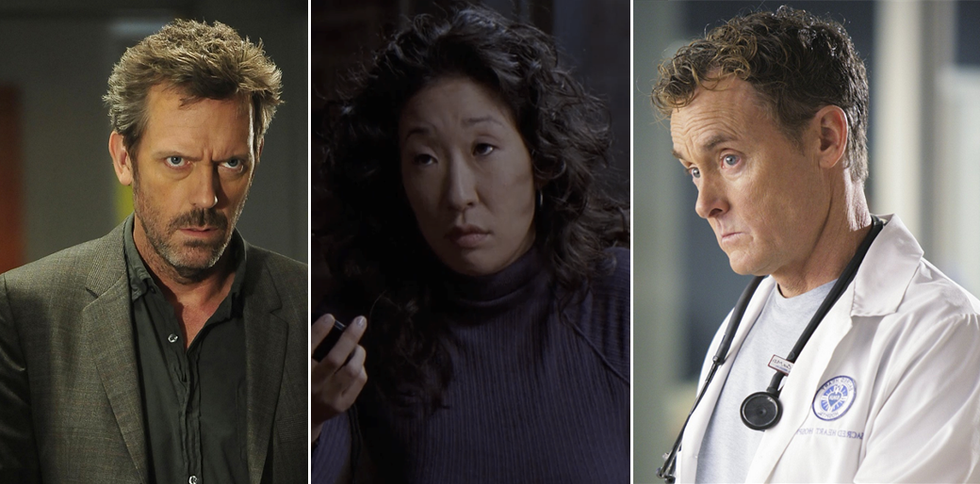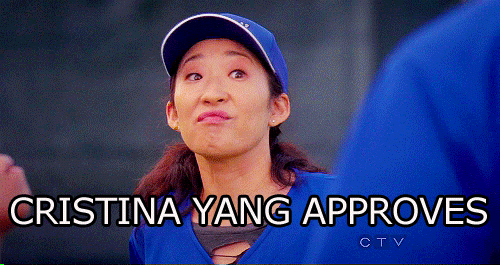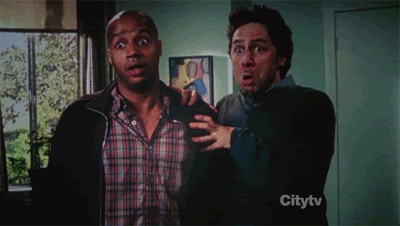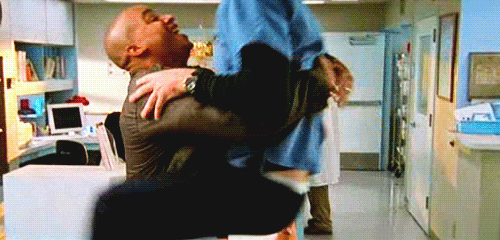Many of us (shoutout to all the premeds reading this!) are drawn to medical shows for the drama, the intrigue, the inspirational stories. However, it’s often difficult to sift out the things we see and hear on TV from our overall perception of medicine. We tend to sponge information from television quite passively, and weeks, months, or even years after, we might not remember where a certain impression came from -- we just accept it to be true. According to the Cultivation Theory, repetitive TV watching can make us more likely to believe the social reality portrayed on-screen, and often misconceive what is true in the real world. Many medical show fans don’t have much contact with real medical education, and not surprisingly, can often pick up on basic medical skills they witness on TV. The shows can also subconsciously shape our perceptions of the healthcare industry and define prevalent health issues in today’s world. Even if we’re not directly watching a certain program, that program could prompt a certain public opinion to circulate, influencing us even more passively. So obviously, television has the potential to really impact our lives.
Place yourself in the shoes of a TV producer for a moment. The truth is, real life won’t sell, and chances are, you’d turn to exaggerations to better captivate your audience. Of course, writers must undergo consultations with real-life doctors and medical experts to assure that medical information is not being butchered. Hollywood, Health & Society is a CDC-funded program that provides entertainment industry professionals with the information they need to compose health-related storylines. HH&S recognizes the large impact that media have on audience knowledge and behavior. However, from the Hollywood perspective, the primary goal of TV shows is to entertain, while minimizing harm/making a positive societal impact drop in priority.
We can assume that shows such as Grey's Anatomy, House, M.D., and Scrubs compromise medical accuracy to some extent in order to entertain the general public, but just how large is the trade-off?
Unrealistic scheduling of TV doctors’ work lives:
This can be seen across the board, and according to a NYTimes article, this is a main source of real doctors’ annoyance. Sure, personal relationships and steamy love triangles are bound to emerge in the hospital, just like any other workplace. But come on... realistically, could all doctors have mutual lunch breaks, mutual times to socialize, and mutual opportunities to go out for drinks? In reality, physicians often work long, fast-paced, and tiring shifts. There isn’t that much time left to socialize.
Downplaying the nursing profession:
House and his elite team essentially do everything at every step in patient care -- from monitoring patients around-the-clock, to administering medications, to providing emotional support. But here's the bigger issue: while Grey’s includes a bunch of nurses, ever since the show's pilot, they've been regarded as inferior and incompetent. The term nurse is often used as an insult, rather than acknowledging nursing as the challenging yet gratifying job that it is. Fans are in for a surprise when they visit a real hospital. They might expect to interact with a physician all the time, but in reality, patients generally get to know their nurses a lot more personally.
Melodrama:
Need I say more? Shows like Grey’s Anatomy and House feature an alarming quantity of climatic, high-adrenaline cases. Nearly every episode of House depicts a rare, convoluted condition. Over the course of an entire career, a real doctor could only encounter several of these high-adrenaline cases. But again, this goes back to producers’ first priority: entertainment.
Ethical issues:
Remember that episode of Grey’s, “Winning a Battle, Losing the War", when Dr. Cristina Yang asks a widow to donate her husband’s organs? Cristina obviously lacks sensitivity and sympathy, sprinting out of the room once the widow begins to cry. Even worse, she persistently asks for the organs because a close friend of the hospital’s chief of surgery is dying and really needs a liver transplant. The way Grey’s approaches this topic could definitely damage how organ donation is viewed in the public eye, maybe even causing potential donors to reconsider.
Misinformation on seizure care:
According to CNN, seizure care is portrayed correctly less than half the time (and these techniques are certainly something that viewers could take away!) TV often depicts doctors holding a seizing patient down to stop involuntary movements, or worse, putting something in the patient’s mouth. In reality, it's best to provide gentle support and prevent potential injury. But how much less dramatic would that look?
Spreading the wrong idea about CPR:
CPR is a common technique that the general public strives to know, yet not many take a formal course. So where would they sponge up information? Family, friends, and that’s right -- television! A study published in the New England Journal of Medicine looked into this and found that, aside from poor form and techniques, CPR is also portrayed to be unrealistically effective. The truth is, CPR only saves lives 5% of the time. With the impression that CPR is a harmless miracle treatment, families of patients with terminal illness might opt against a DNR (which, if signed, would prohibit doctors from performing CPR). DNRs are sometimes the better option, medically and morally, and so, it’s important that the general public does not get the wrong idea.
Poor portrayal of patient-physician relationships:
Aside from being a drug-addict, Dr. House really lacks people skills. Sure, he cares about his patients' health, but if real doctors were that rude, they might find themselves out of a job. It's hard to get by solely on brilliance. On the opposite side of the spectrum, many doctors in Grey’s develop personal investments in their patients. Teddy marries her patient to give him health insurance. Izzie Stevens falls in love with her patient and risks her career in an effort to unethically save his life.
Disclaimer: I LOVE all three of these shows, especially Grey's, which really gets a beating. On the flip side, here are some things we can learn:
- Residency is hard work.
- Collaboration is super important.
- Doctors struggle with ethical issues.
- Doctors make mistakes. Despite the fact that TV might sometimes depict mistakes that are illegal and let characters get away with them… mistakes happen
Pros of House, M.D.:
House does a great job at showing differential diagnosis, which is a key part of medicine. It emphasizes that diagnosing a patient isn’t easy and involves looking at all of the symptoms a patient has, along with what symptoms a patient doesn’t have. If you want to learn a bunch of impressive medical vocabulary and a little about some obscure conditions, House can be your go-to. Still, some of the situations are way too far-fetched, and what are the odds that they’d actually happen? Slim. Another key lesson: it's never lupus.
Pros of Grey’s Anatomy:
In 2008, the Kaiser Family Foundation looked into the Grey’s episode “Piece of My Heart,” in which a pregnant couple approaches Dr. Izzie Stevens and asks for an abortion because the mother-to-be is HIV positive. The statistic that “there is a 98% chance your baby will be born perfectly healthy” is repeated multiple times throughout the episode, and upon surveying viewers pre-air, post-air, and six-weeks-post-air, they found that this key information was mostly retained, even long-term. Grey’s could have taught an HIV-positive couple out there that they can still have a child without passing on the disease. When it comes down to it, Grey’s Anatomy is really just a romance drama, but this study highlighted something pretty important. TV can be used to raise public health awareness and debunk common misconceptions. Graham Walker, a fourth year medical student at Stanford attests that “there are simple things that wouldn’t have any detrimental effect to the entertainment quality of the show — that would barely even change dialogue — that could provide subconscious education to the lay public.”
Pros of Scrubs:
Many say this goofy sitcom wins for being the most accurate portrayal of the medical profession on TV.
It’s a favorite among many medical professionals, and was actually created based on memorable moments from the residency of Dr. Jonathan Doris (a college friend of the show’s creator). Many physicians agree that Scrubs is accurate about depicting hospital culture: how doctors interact with patients, with nurses, and with one another. The plot is also built on realistic every-day encounters and captures the audience through the main character’s reflections on those encounters. According to Dr. Jonathan Samuels, a rheumatologist at NYU Hospital, "[Scrubs character, JD] says exactly what a resident feels, day in or day out. 'Am I hurting the patient? Am I learning what I should? Am I kissing up too much to the attending?'” Alexandra Chabrerie, a doctor at Harvard admits: “In med school, this is what we did. We lay in our beds and watched Scrubs…At the end of the day, we see [the same things] all the time.” Even though Scrubs is a comedy, you can actually learn a lot about what runs through a doctor's mind and why a medical career can be so rewarding.
What to take away?
For the most part, the medical information itself is more or less reliable (thanks HH&S!), and if anything is compromised, it would be the realities of hospital culture and what the healthcare industry is really like. It’s important to remember that TV is TV, and you can’t take medical shows, or anything else on TV too seriously. The fun is not necessarily in the medicine, but rather, in the entertainment.
























